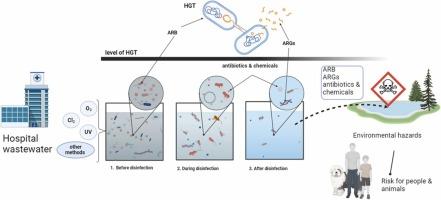当前位置:
X-MOL 学术
›
J. Hazard. Mater.
›
论文详情
Our official English website, www.x-mol.net, welcomes your
feedback! (Note: you will need to create a separate account there.)
ARB inactivation, ARGs and antibiotics degradation in hospital wastewater
Journal of Hazardous Materials ( IF 12.2 ) Pub Date : 2025-06-04 , DOI: 10.1016/j.jhazmat.2025.138833
Kornelia Stefaniak, Monika Harnisz, Magdalena Męcik, Ewa Korzeniewsk
Journal of Hazardous Materials ( IF 12.2 ) Pub Date : 2025-06-04 , DOI: 10.1016/j.jhazmat.2025.138833
Kornelia Stefaniak, Monika Harnisz, Magdalena Męcik, Ewa Korzeniewsk

|
Antibiotic resistance (AR) is one of the greatest public health challenges worldwide. Processes that allow the reduction of AR predictor of hospital wastewater has become crucial process that contributes to the protection of public health and the environment. The aim of this review article was to compare the effectiveness of various methods for treatment hospital wastewater in eliminating antibiotic-resistant bacteria (ARB) and degrading antibiotic resistance genes (ARGs) and antibiotics. A large number of studies dealing with wastewater treatment suggest that this topic is highly relevant and that new solutions are being developed to limit the spread of AR. Some wastewater treatment techniques have been in use for decades. Despite the negative effects of chlorine compounds, chlorination is still applied to eliminate ARB, ARGs, and drug metabolites. Ultraviolet (UV) radiation and ozonation have long been recognized for their treating properties. In the literature, advanced oxidation processes (AOPs) are increasingly often indicated as the most effective alternative to conventional treatment methods. Various methods for disinfecting hospital wastewater were reviewed and their environmental impact was analyzed in this article, and the results provide valuable insights for the further development of effective wastewater management strategies.
中文翻译:

医院废水中的 ARB 灭活、ARG 和抗生素降解
抗生素耐药性 (AR) 是全球最大的公共卫生挑战之一。允许减少医院废水的 AR 预测因子的过程已成为有助于保护公共卫生和环境的关键过程。本综述文章的目的是比较各种处理医院废水的方法在消除抗生素耐药菌 (ARB) 和降解抗生素耐药基因 (ARG) 和抗生素方面的有效性。大量涉及废水处理的研究表明,该主题具有高度相关性,并且正在开发新的解决方案来限制 AR 的传播。一些废水处理技术已经使用了几十年。尽管氯化合物有负面影响,但氯化仍可用于消除 ARB、ARG 和药物代谢物。紫外线 (UV) 辐射和臭氧化长期以来一直因其处理特性而得到认可。在文献中,高级氧化过程 (AOP) 越来越多地被认为是传统处理方法的最有效替代方案。本文综述了医院废水消毒的各种方法,并分析了其环境影响,结果为进一步制定有效的废水管理策略提供了有价值的见解。
更新日期:2025-06-04
中文翻译:

医院废水中的 ARB 灭活、ARG 和抗生素降解
抗生素耐药性 (AR) 是全球最大的公共卫生挑战之一。允许减少医院废水的 AR 预测因子的过程已成为有助于保护公共卫生和环境的关键过程。本综述文章的目的是比较各种处理医院废水的方法在消除抗生素耐药菌 (ARB) 和降解抗生素耐药基因 (ARG) 和抗生素方面的有效性。大量涉及废水处理的研究表明,该主题具有高度相关性,并且正在开发新的解决方案来限制 AR 的传播。一些废水处理技术已经使用了几十年。尽管氯化合物有负面影响,但氯化仍可用于消除 ARB、ARG 和药物代谢物。紫外线 (UV) 辐射和臭氧化长期以来一直因其处理特性而得到认可。在文献中,高级氧化过程 (AOP) 越来越多地被认为是传统处理方法的最有效替代方案。本文综述了医院废水消毒的各种方法,并分析了其环境影响,结果为进一步制定有效的废水管理策略提供了有价值的见解。


















































 京公网安备 11010802027423号
京公网安备 11010802027423号